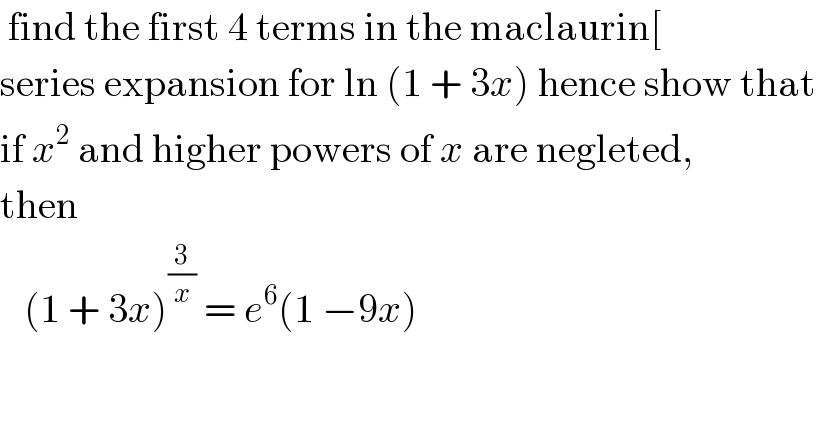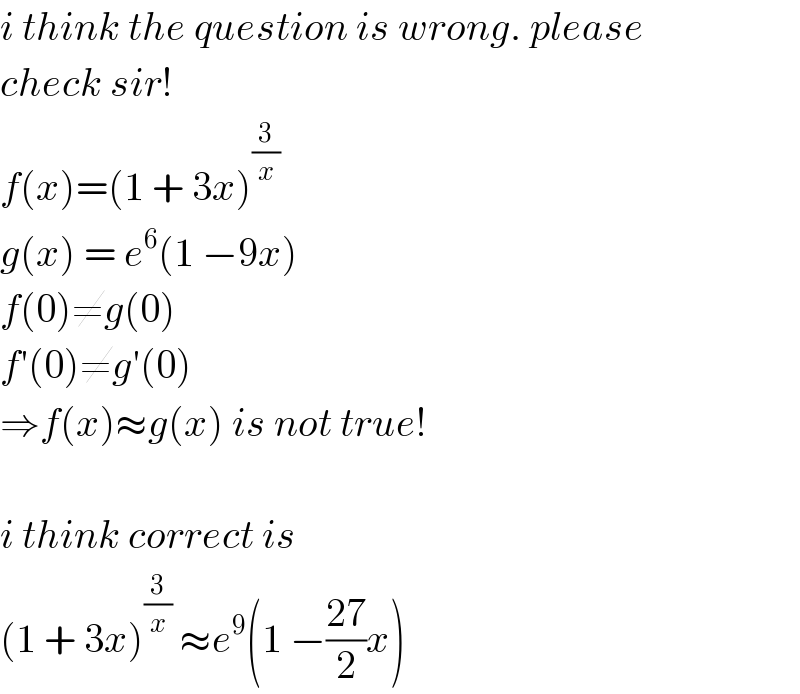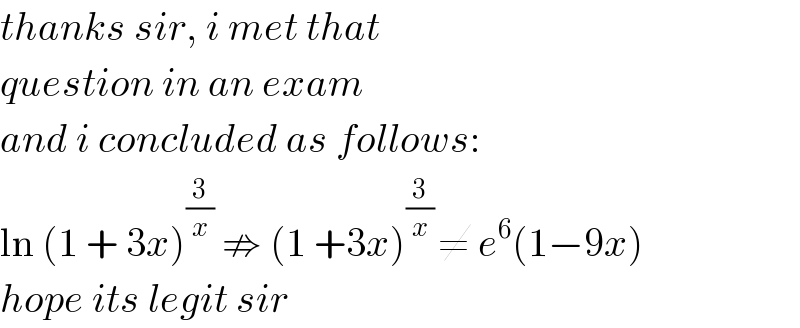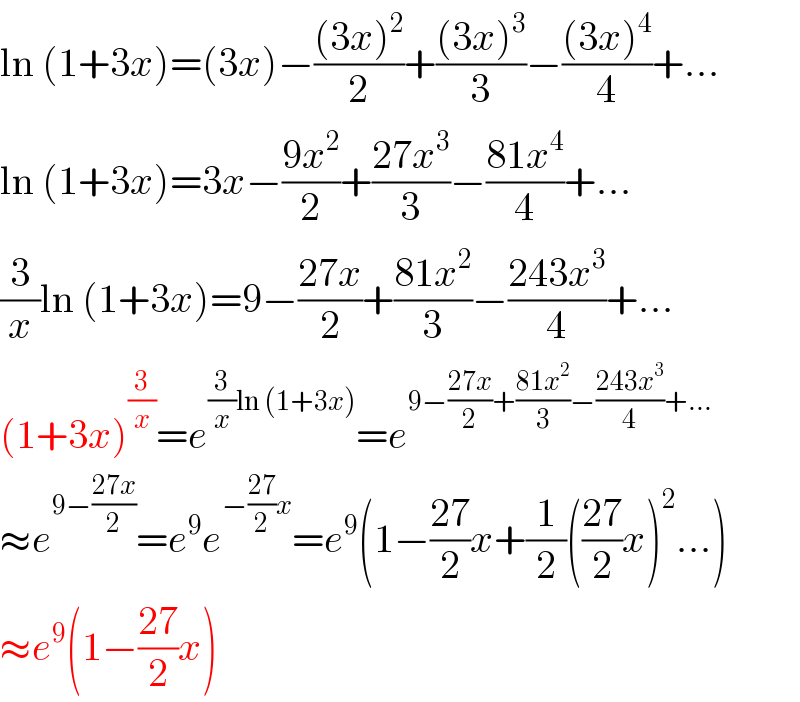Question Number 83202 by Rio Michael last updated on 28/Feb/20

$$\:\mathrm{find}\:\mathrm{the}\:\mathrm{first}\:\mathrm{4}\:\mathrm{terms}\:\mathrm{in}\:\mathrm{the}\:\mathrm{maclaurin}\left[\right. \\ $$$$\mathrm{series}\:\mathrm{expansion}\:\mathrm{for}\:\mathrm{ln}\:\left(\mathrm{1}\:+\:\mathrm{3}{x}\right)\:\mathrm{hence}\:\mathrm{show}\:\mathrm{that} \\ $$$$\mathrm{if}\:{x}^{\mathrm{2}} \:\mathrm{and}\:\mathrm{higher}\:\mathrm{powers}\:\mathrm{of}\:{x}\:\mathrm{are}\:\mathrm{negleted}, \\ $$$$\mathrm{then}\: \\ $$$$\:\:\:\left(\mathrm{1}\:+\:\mathrm{3}{x}\right)^{\frac{\mathrm{3}}{{x}}} \:=\:{e}^{\mathrm{6}} \left(\mathrm{1}\:−\mathrm{9}{x}\right) \\ $$
Commented by mr W last updated on 28/Feb/20

$${i}\:{think}\:{the}\:{question}\:{is}\:{wrong}.\:{please} \\ $$$${check}\:{sir}! \\ $$$${f}\left({x}\right)=\left(\mathrm{1}\:+\:\mathrm{3}{x}\right)^{\frac{\mathrm{3}}{{x}}} \\ $$$${g}\left({x}\right)\:=\:{e}^{\mathrm{6}} \left(\mathrm{1}\:−\mathrm{9}{x}\right) \\ $$$${f}\left(\mathrm{0}\right)\neq{g}\left(\mathrm{0}\right) \\ $$$${f}'\left(\mathrm{0}\right)\neq{g}'\left(\mathrm{0}\right) \\ $$$$\Rightarrow{f}\left({x}\right)\approx{g}\left({x}\right)\:{is}\:{not}\:{true}! \\ $$$$ \\ $$$${i}\:{think}\:{correct}\:{is} \\ $$$$\left(\mathrm{1}\:+\:\mathrm{3}{x}\right)^{\frac{\mathrm{3}}{{x}}} \:\approx{e}^{\mathrm{9}} \left(\mathrm{1}\:−\frac{\mathrm{27}}{\mathrm{2}}{x}\right) \\ $$
Commented by Rio Michael last updated on 28/Feb/20

$${thanks}\:{sir},\:{i}\:{met}\:{that}\: \\ $$$${question}\:{in}\:{an}\:{exam}\: \\ $$$${and}\:{i}\:{concluded}\:{as}\:{follows}: \\ $$$$\mathrm{ln}\:\left(\mathrm{1}\:+\:\mathrm{3}{x}\right)^{\frac{\mathrm{3}}{{x}}} \:\nRightarrow\:\left(\mathrm{1}\:+\mathrm{3}{x}\right)^{\frac{\mathrm{3}}{{x}}\:} \neq\:{e}^{\mathrm{6}} \left(\mathrm{1}−\mathrm{9}{x}\right) \\ $$$${hope}\:{its}\:{legit}\:{sir} \\ $$
Commented by mr W last updated on 28/Feb/20

$$\mathrm{ln}\:\left(\mathrm{1}+\mathrm{3}{x}\right)=\left(\mathrm{3}{x}\right)−\frac{\left(\mathrm{3}{x}\right)^{\mathrm{2}} }{\mathrm{2}}+\frac{\left(\mathrm{3}{x}\right)^{\mathrm{3}} }{\mathrm{3}}−\frac{\left(\mathrm{3}{x}\right)^{\mathrm{4}} }{\mathrm{4}}+… \\ $$$$\mathrm{ln}\:\left(\mathrm{1}+\mathrm{3}{x}\right)=\mathrm{3}{x}−\frac{\mathrm{9}{x}^{\mathrm{2}} }{\mathrm{2}}+\frac{\mathrm{27}{x}^{\mathrm{3}} }{\mathrm{3}}−\frac{\mathrm{81}{x}^{\mathrm{4}} }{\mathrm{4}}+… \\ $$$$\frac{\mathrm{3}}{{x}}\mathrm{ln}\:\left(\mathrm{1}+\mathrm{3}{x}\right)=\mathrm{9}−\frac{\mathrm{27}{x}}{\mathrm{2}}+\frac{\mathrm{81}{x}^{\mathrm{2}} }{\mathrm{3}}−\frac{\mathrm{243}{x}^{\mathrm{3}} }{\mathrm{4}}+… \\ $$$$\left(\mathrm{1}+\mathrm{3}{x}\right)^{\frac{\mathrm{3}}{{x}}} ={e}^{\frac{\mathrm{3}}{{x}}\mathrm{ln}\:\left(\mathrm{1}+\mathrm{3}{x}\right)} ={e}^{\mathrm{9}−\frac{\mathrm{27}{x}}{\mathrm{2}}+\frac{\mathrm{81}{x}^{\mathrm{2}} }{\mathrm{3}}−\frac{\mathrm{243}{x}^{\mathrm{3}} }{\mathrm{4}}+…} \\ $$$$\approx{e}^{\mathrm{9}−\frac{\mathrm{27}{x}}{\mathrm{2}}} ={e}^{\mathrm{9}} {e}^{−\frac{\mathrm{27}}{\mathrm{2}}{x}} ={e}^{\mathrm{9}} \left(\mathrm{1}−\frac{\mathrm{27}}{\mathrm{2}}{x}+\frac{\mathrm{1}}{\mathrm{2}}\left(\frac{\mathrm{27}}{\mathrm{2}}{x}\right)^{\mathrm{2}} …\right) \\ $$$$\approx{e}^{\mathrm{9}} \left(\mathrm{1}−\frac{\mathrm{27}}{\mathrm{2}}{x}\right) \\ $$
Commented by Rio Michael last updated on 28/Feb/20

$${thanks}\:{sir} \\ $$
